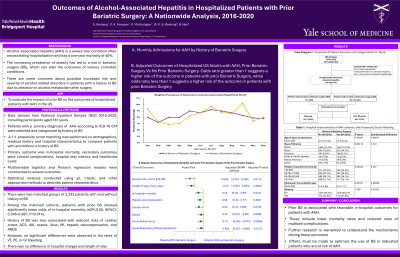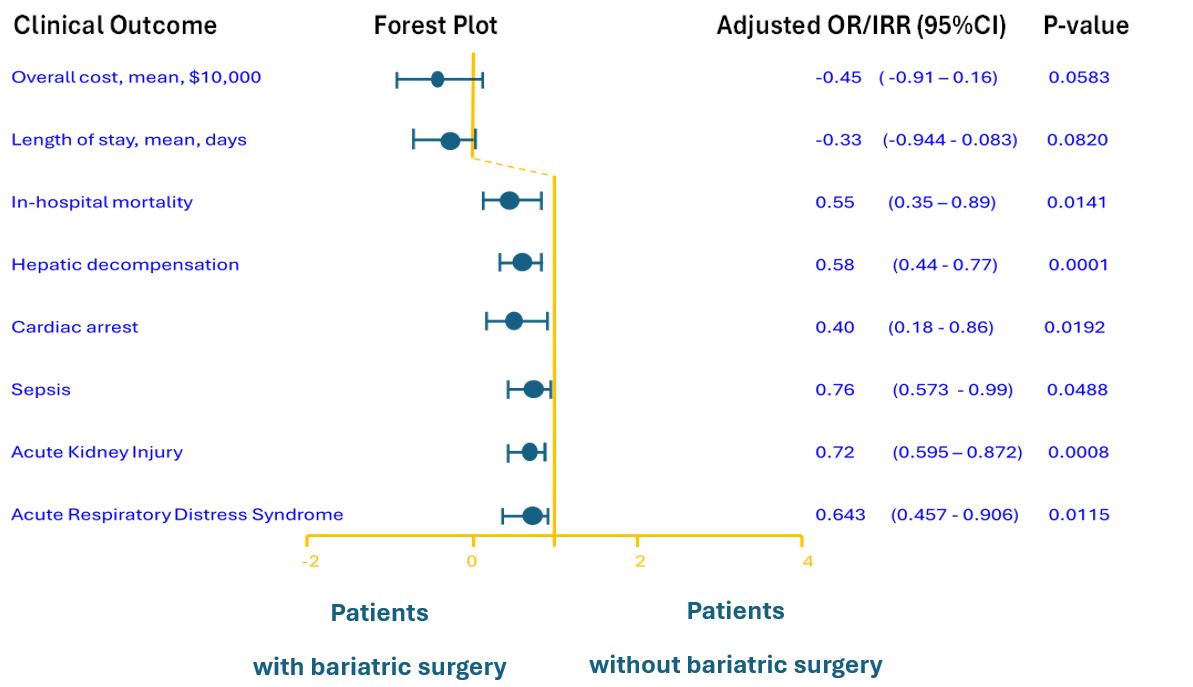Monday Poster Session
Category: Obesity
P3165 - Outcomes of Alcohol-Associated Hepatitis in Hospitalized Patients With Prior Bariatric Surgery: A Nationwide Analysis, 2016-2020
Monday, October 28, 2024
10:30 AM - 4:00 PM ET
Location: Exhibit Hall E

Has Audio

Sarpong Boateng, MD, MPH
Yale New Haven Health, Bridgeport Hospital
Bridgeport, CT
Presenting Author(s)
Sarpong Boateng, MD, MPH1, Prince A. Ameyaw, MD1, Karthik Mathialagan, MD1, William KB. Boateng, MD2, Basile Njei, MD3
1Yale New Haven Health, Bridgeport Hospital, Bridgeport, CT; 2Jersey City Medical Center, Bayonne, NJ; 3Yale University School of Medicine, New Haven, CT
Introduction: Alcohol-associated hepatitis (AAH) is a severe liver condition often necessitating hospitalization and has a one-year mortality of 40%. The increasing prevalence of obesity has led to a rise in bariatric surgery (BS), which can alter the outcomes of various comorbid conditions. There are some concerns about possible increased risk and severity of alcohol related disorders in patients with a history of BS due to alteration in alcohol metabolism after surgery. This study aims to evaluate the impact of prior BS on the outcomes of hospitalized patients with AAH in the US.
Methods: We conducted a retrospective analysis using the Nationwide Inpatient Sample database. Hospitalized adult patients diagnosed with AAH between 2016-2020 were identified. A 1:1 propensity score matching was performed to compare patients with and without a history of BS, resulting in two matched groups of 2242 patients each. The primary outcome was in-hospital mortality. Secondary outcomes included cardiac arrest, acute coronary syndrome (ACS), acute kidney injury (AKI), sepsis, ileus, myocardial infarction (MI), shock, venous thrombosis (VT), pulmonary embolism (PE), gastrointestinal (GI) bleeding, hepatic decompensation, acute respiratory distress syndrome (ARDS), and several procedural outcomes. Adjusted odds ratios (aORs) and incidence rate ratios (aIRRs) were derived using multivariable logistic and Poisson regression.
Results: Among the matched cohorts, patients with prior BS showed significantly lower odds of in-hospital mortality (aOR:0.55, 95%CI: 0.345–0.887, P=0.014). BS was associated with reduced risks of cardiac arrest (aOR:0.40, 95%CI: 0.18–0.86, P=0.0192), ACS (aOR:0.24, 95%CI: 0.074–0.803, P=0.0203), AKI (aOR: 0.72, 95% CI: 0.60–0.872, P=0.0008), sepsis (aOR:0.757, 95%CI:0.57–0.999, P=0.0488), ileus (aOR:0.45, 95% CI:0.21–0.95, P=0.0349), MI (aOR:0.269, 95%CI:0.079–0.923, P=0.0369), hepatic decompensation (aOR:0.582, 95% CI:0.441–0.769, P=0.0001), and ARDS (aOR:0.643, 95%CI: 0.457–0.906, P=0.0115). However, no significant differences were observed in the rates of VT, PE, or GI bleeding. Also, there was no difference in hospitalization charges and length of stay.
Discussion: Prior BS is associated with favorable in-hospital outcomes for patients with AAH. These include lower mortality rates and reduced risks of multiple complications. Further research is warranted to understand the mechanisms driving these outcomes, and to optimize the use of BS in indicated patients who are at risk of AAH.

Note: The table for this abstract can be viewed in the ePoster Gallery section of the ACG 2024 ePoster Site or in The American Journal of Gastroenterology's abstract supplement issue, both of which will be available starting October 27, 2024.
Disclosures:
Sarpong Boateng, MD, MPH1, Prince A. Ameyaw, MD1, Karthik Mathialagan, MD1, William KB. Boateng, MD2, Basile Njei, MD3. P3165 - Outcomes of Alcohol-Associated Hepatitis in Hospitalized Patients With Prior Bariatric Surgery: A Nationwide Analysis, 2016-2020, ACG 2024 Annual Scientific Meeting Abstracts. Philadelphia, PA: American College of Gastroenterology.
1Yale New Haven Health, Bridgeport Hospital, Bridgeport, CT; 2Jersey City Medical Center, Bayonne, NJ; 3Yale University School of Medicine, New Haven, CT
Introduction: Alcohol-associated hepatitis (AAH) is a severe liver condition often necessitating hospitalization and has a one-year mortality of 40%. The increasing prevalence of obesity has led to a rise in bariatric surgery (BS), which can alter the outcomes of various comorbid conditions. There are some concerns about possible increased risk and severity of alcohol related disorders in patients with a history of BS due to alteration in alcohol metabolism after surgery. This study aims to evaluate the impact of prior BS on the outcomes of hospitalized patients with AAH in the US.
Methods: We conducted a retrospective analysis using the Nationwide Inpatient Sample database. Hospitalized adult patients diagnosed with AAH between 2016-2020 were identified. A 1:1 propensity score matching was performed to compare patients with and without a history of BS, resulting in two matched groups of 2242 patients each. The primary outcome was in-hospital mortality. Secondary outcomes included cardiac arrest, acute coronary syndrome (ACS), acute kidney injury (AKI), sepsis, ileus, myocardial infarction (MI), shock, venous thrombosis (VT), pulmonary embolism (PE), gastrointestinal (GI) bleeding, hepatic decompensation, acute respiratory distress syndrome (ARDS), and several procedural outcomes. Adjusted odds ratios (aORs) and incidence rate ratios (aIRRs) were derived using multivariable logistic and Poisson regression.
Results: Among the matched cohorts, patients with prior BS showed significantly lower odds of in-hospital mortality (aOR:0.55, 95%CI: 0.345–0.887, P=0.014). BS was associated with reduced risks of cardiac arrest (aOR:0.40, 95%CI: 0.18–0.86, P=0.0192), ACS (aOR:0.24, 95%CI: 0.074–0.803, P=0.0203), AKI (aOR: 0.72, 95% CI: 0.60–0.872, P=0.0008), sepsis (aOR:0.757, 95%CI:0.57–0.999, P=0.0488), ileus (aOR:0.45, 95% CI:0.21–0.95, P=0.0349), MI (aOR:0.269, 95%CI:0.079–0.923, P=0.0369), hepatic decompensation (aOR:0.582, 95% CI:0.441–0.769, P=0.0001), and ARDS (aOR:0.643, 95%CI: 0.457–0.906, P=0.0115). However, no significant differences were observed in the rates of VT, PE, or GI bleeding. Also, there was no difference in hospitalization charges and length of stay.
Discussion: Prior BS is associated with favorable in-hospital outcomes for patients with AAH. These include lower mortality rates and reduced risks of multiple complications. Further research is warranted to understand the mechanisms driving these outcomes, and to optimize the use of BS in indicated patients who are at risk of AAH.

Figure: Forest plot of adjusted odds ratios for clinical outcomes in hospitalized us adults with AAH
Note: The table for this abstract can be viewed in the ePoster Gallery section of the ACG 2024 ePoster Site or in The American Journal of Gastroenterology's abstract supplement issue, both of which will be available starting October 27, 2024.
Disclosures:
Sarpong Boateng indicated no relevant financial relationships.
Prince Ameyaw indicated no relevant financial relationships.
Karthik Mathialagan indicated no relevant financial relationships.
William Boateng indicated no relevant financial relationships.
Basile Njei indicated no relevant financial relationships.
Sarpong Boateng, MD, MPH1, Prince A. Ameyaw, MD1, Karthik Mathialagan, MD1, William KB. Boateng, MD2, Basile Njei, MD3. P3165 - Outcomes of Alcohol-Associated Hepatitis in Hospitalized Patients With Prior Bariatric Surgery: A Nationwide Analysis, 2016-2020, ACG 2024 Annual Scientific Meeting Abstracts. Philadelphia, PA: American College of Gastroenterology.

